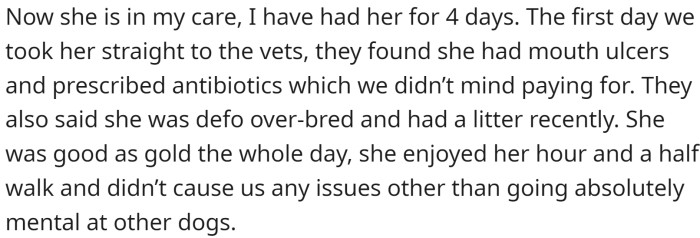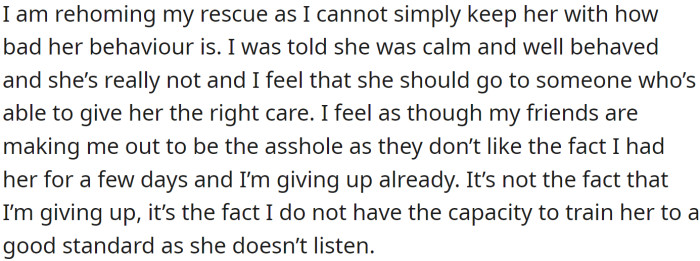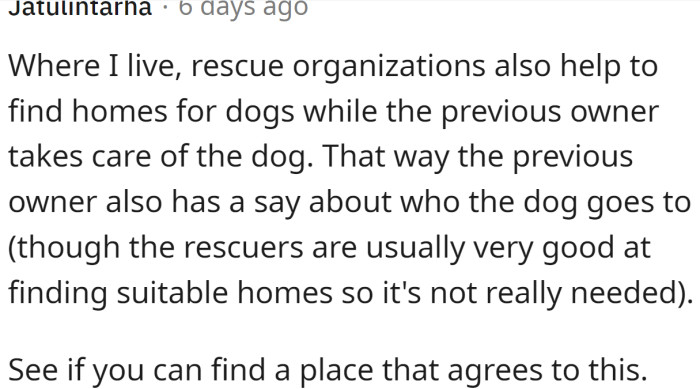A Tale Of Redditor's Heartbreaking Decision To Rehome A Troubled Rescue Dog
Rescuing a pet is a noble act that many animal lovers undertake. Unfortunately, sometimes the circumstances surrounding the animal's adoption change, and the owner may find that they cannot provide the level of care and attention that the pet needs.
In such situations, it may be in the best interest of the animal to rehome them with a more suitable family. Despite the best intentions and preparation, the reality of owning a pet can sometimes be challenging.
Life can take unexpected turns, such as new work schedules, health issues, or financial difficulties, making it challenging to provide a loving home for the pet. Additionally, some pets may develop behavioral issues that are difficult to address or may be incompatible with other pets in the household, leading to conflicts and stress.
The OP's friend rescued an American Bulldog who was malnourished and overbred, paying £80 for her. However, after bringing her home, their friend's pregnant partner couldn't look after her due to her existing dog not getting along with the rescue dog.
The OP agreed to take the dog in, discovering that she was good on the lead, good while walking, scared of men, and did not like cats. After four days, the dog's health had improved, but she was very reactive and aggressive towards other dogs and noises, making it difficult to walk her.
The OP made the difficult decision to rehome the dog to someone who could better train her and give her a good life. Despite feeling guilty, they couldn't handle the dog's behavior and felt they had no other choice.
OP asks:

The OP's friend rescued an American Bulldog who was malnourished and overbred, paying £80 for her.

However, after bringing her home, their friend's pregnant partner couldn't look after her due to her existing dog not getting along with the rescue dog.

The Emotional Toll of Rehoming a Pet
Rehoming a pet can evoke a complex range of emotions, both for the owner and the animal. According to research published in the Journal of Applied Animal Welfare Science, pet owners who experience the need to surrender their pets often undergo significant emotional distress, which can include feelings of guilt, sadness, and anxiety. This emotional upheaval is compounded by the bond that develops between humans and animals, which is deeply rooted in attachment theory.
Attachment theory, as described by John Bowlby, illustrates that pets can become 'secure bases' for their owners, providing emotional support and companionship. Losing that connection can lead to what some psychologists refer to as 'complicated grief,' where the individual not only mourns the loss of the pet but also grapples with feelings of failure in their caregiving role.
The Emotional Weight of Rehoming a Pet
Dr. Rachel Adams, a pet therapy specialist, explains the emotional complexities involved in rehoming a pet.
Research shows that the decision to give up a pet often comes with significant feelings of guilt and sadness.
This can be exacerbated by the bond that develops between humans and animals, making the decision feel even more painful.
The OP agreed to take the dog in, finding out that she was good on the lead, good while walking, scared of men, and did not like cats.

After four days, the dog's health had improved, but she was very reactive and aggressive towards other dogs and noises, making it difficult to walk her.

The OP made the difficult decision to rehome the dog to someone who could better train her and give her a good life.

Research by Dr. Kendra Calhoun at the University of Michigan highlights how the decision to rehome a pet can trigger a grief process similar to losing a human loved one. Her studies found that individuals often experience a range of emotions, including denial, anger, and acceptance regarding their decision. The grief cycle, originally proposed by Elisabeth Kübler-Ross, can manifest distinctly in these scenarios, showing that the loss of a pet can significantly impact mental health.
Furthermore, studies show that these emotional responses can lead to increased stress levels and even depressive symptoms in the owner post-rehoming. Understanding this emotional landscape is crucial for owners facing such difficult decisions, as it can guide them in seeking support from friends, family, or mental health professionals.
Psychological studies indicate that individuals may experience a sense of loss similar to grieving when they rehome a pet.
These feelings can include sadness, regret, and anxiety about the pet's future, showcasing the deep emotional attachments we form with our animal companions.
The OP feels incredibly guilty about it.

But they believe it is the best for the dog.

The OP has offered the following explanation for why they think they might be the a-hole:

Understanding Behavioral Issues in Rescue Dogs
Many rescue dogs come with a history of trauma and behavioral challenges, which can complicate their integration into a new home. Research published in the journal Animal Behavior shows that these dogs often exhibit signs of anxiety, fear, and aggression stemming from past neglect or abuse. Behavioral issues can create a cycle of frustration and disappointment for owners, leading to feelings of inadequacy as caregivers.
Dr. John Wright, a clinical animal behaviorist, emphasizes the importance of understanding the underlying causes of these behaviors. His work shows that patience, consistent training, and positive reinforcement can significantly improve a rescue dog’s behavior over time. This aligns with the principles of operant conditioning, where desired behaviors are reinforced through rewards, fostering a stronger bond between the pet and the owner.
Navigating Difficult Decisions
Experts recommend acknowledging the emotional turmoil that comes with making such a decision.
Understanding the factors that lead to rehoming, such as financial constraints or behavioral issues, can help individuals process their feelings.
Research suggests that reflecting on these motivations can provide clarity and reduce feelings of guilt.
She's the wrong dog for the OP.

The OP should pass her off to safe hands.

The OP replied:

Practical strategies can ease the process of integrating a troubled rescue dog into a home. Behavioral training programs, as noted by the American Kennel Club, often recommend starting with basic commands and gradually introducing more complex tasks as the dog becomes comfortable. This gradual approach allows both the owner and the dog to build trust and establish a positive relationship.
Additionally, using tools like a journal to track progress can help owners recognize improvements in behavior and build confidence in their abilities as caregivers. Research from the American Psychological Association suggests that self-monitoring and reflection can enhance motivation and emotional resilience, making the journey of pet ownership more fulfilling.
Additionally, seeking support from friends, family, or pet support groups can offer comfort during this challenging time.
Supportive conversations can help individuals process their emotions and validate their feelings, which is crucial for healing.
This Redditor has some good advice.

The OP should find such organizations.

Maybe training?

The Role of Support Systems
When faced with the challenge of rehoming a troubled rescue dog, the role of support systems cannot be overstated. Research indicates that social support can significantly mitigate feelings of distress and isolation experienced during tough transitions. A study published in the Journal of Community Psychology found that individuals with a strong social network report lower levels of anxiety and depression, especially during life changes such as rehoming a pet.
Connecting with local animal welfare organizations or online communities can provide emotional support and practical advice for owners navigating these difficult decisions. Furthermore, sharing experiences with others who have faced similar challenges can foster a sense of community and validation, reducing feelings of shame associated with rehoming a pet.
The Impact of Attachment on Decision-Making
Attachment theory explains how our emotional bonds influence our decision-making processes.
According to Dr. John Bowlby, the founder of attachment theory, our early relationships shape how we connect with others, including pets.
Understanding this can help individuals navigate the emotional landscape of rehoming a pet.
The OP replied:

Rehoming a pet should not be seen as a failure but rather as an act of kindness and responsible pet ownership. By finding a new loving home for the pet, the owner is ensuring that the animal receives the care and attention it deserves and will have a better quality of life.
It is essential to work with reputable animal rescue organizations or trustworthy families to find a suitable new home for the pet.
Experts suggest that creating a plan for the pet's future can alleviate some anxiety associated with rehoming.
Knowing that the pet will go to a loving home can provide a sense of closure and comfort.
Research shows that having a plan can reduce feelings of uncertainty and allow individuals to focus on the positive aspects of the transition.
Fostering Healing Through Reflection
Engaging in self-reflection can facilitate healing after rehoming.
Journaling about the experience and the feelings involved can provide insights and promote emotional processing.
Studies show that expressive writing can lead to improved emotional well-being and reduce distress.
Incorporating positive memories of the pet into the healing process can also help.
Creating a scrapbook or sharing stories about the pet can help individuals celebrate their time together while processing the decision to rehome.
Psychological Analysis
This situation highlights the emotional complexities surrounding pet ownership and rehoming.
Recognizing the deep bonds we share with our pets can help individuals navigate the feelings associated with such decisions.
Analysis generated by AI
Analysis & Alternative Approaches
Ultimately, the decision to rehome a pet is a deeply emotional one that can evoke a range of feelings.
Research underscores the importance of processing these emotions and seeking support during challenging transitions.
By acknowledging and reflecting on these feelings, individuals can find a path toward healing.
Analysis & Recommendations
Rehoming a pet is ultimately a decision made with the animal's best interests at heart, but it’s also a process laden with emotional complexity for the owner. Research from the National Institute of Mental Health confirms that these emotional challenges can be addressed through support systems and effective behavioral training strategies. Understanding the psychological dynamics at play can empower owners to make informed choices while prioritizing their mental well-being. Ultimately, fostering a community of support and utilizing evidence-based approaches can create a more compassionate environment for both the pet and the owner, allowing for healing and growth.



